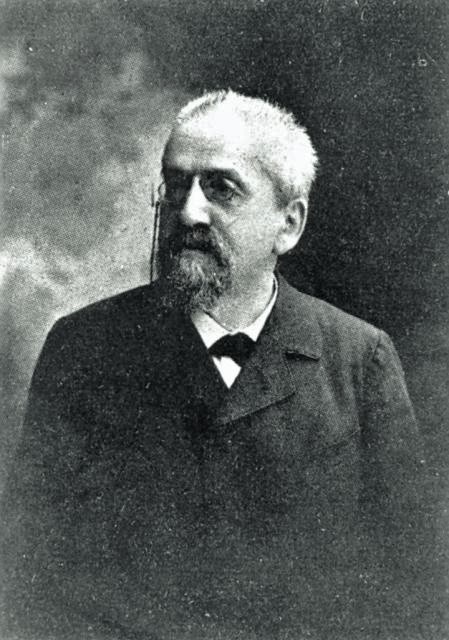Henryk Wohl was head of the Treasury Department of the National Government during the January Rising. For his participation in the uprising, the Russians sentenced him to long-term exile. In his will, he bequeathed his property to patriotic organisations supporting both Poles and Jews.
Wohl was born in 1836, probably in Warsaw into a Jewish family. He originated from the milieu of the Warsaw Rabbinical School which prepared candidates for the position of rabbi or teacher in Jewish schools, but in practice many of its graduates worked in other professions or undertook university studies. The school was aimed at assimilated or assimilating Jews. Lectures were given in Polish and the teachers included not only Jews, but also Christians.
After graduating from it, Wohl began working as an accountant in a Warsaw bank owned by Samuel Antoni Frenkel. During this time, as a 20-year-old, he made underground contacts. In 1859, he belonged to a youth group, participating in patriotic meetings. These were run by the landowner Narcyz Jankowski, who had arrived in Warsaw in 1858, having previously sold his estate in the Kiev region. Jankowski used the funds he possessed to activate young people, especially academics, in patriotic activities. His intentions were very serious and led to the organisation of an insurrectionary struggle. To this end, a committee was formed within the group, with Wohl as a member.
The experience of working with Jankowski led Wohl to decide to abandon the idea of active struggle, joining the so-called Jürgens group (milleners), who promoted the idea of organic work rather than armed insurrection. Like Wohl, Edward Jürgens was Jewish. He was called the leader of the Warsaw liberal bourgeoisie. Eventually, the future “minister” of the treasury of the National Government joined the “whites”. This colloquial term was used to describe the moderate (conservative-liberal) faction within the Polish national movement, established before the January Uprising and active during its duration. This camp grouped landowners, the bourgeoisie and Warsaw intelligentsia. Its left wing was made up of milleners, to whom Wohl belonged. “Whites” did not support an open, armed struggle against the invader, taking the view that it could be replaced by organic work, negotiations with the Tsar or participation in peaceful demonstrations.
Unfortunately, so far, no researcher has discovered why Wohl ultimately decided to join the uprising. We only know that he did it not immediately after its outbreak. He probably joined the Treasury Department of the National Government of the January Uprising in the spring or summer of 1863.
Once he was in the Department, he came up with the idea of issuing an appeal to the people of Warsaw, asking them to provide financial support for the Government. The campaign was an unexpected success – six million roubles were collected, half a million of which was donated by the Warsaw banker Leopold Kronenberg (1812-1879). The financier was personally unconvinced by the active struggle, proclaiming all over the place that, after its defeat, the money could be used to save people.
In August 1863. Wohl took over the leadership of the Department, which he held under Romuald Traugutt (1826-1864). Unfortunately, already in November he was arrested by the Russian authorities. “Minister”, however, was not proven to be a member of either an armed or conspiratorial organisation, and after a month’s detention in the Citadel, he was exiled to Siberia. Wohl was sent to Solikamsk in the Perm Governorate. There, however, news of his actual role in the uprising reached him, so the investigation into his case was reopened and continued in Vladimir. According to historian Marek Gałęzowski, this led to Wohl’s conviction, but he was not sentenced to death, as we read in various studies, but received a sentence of ten years’ hard labour in Usol.
In 1866, he moved into the home of an exile from Volhynia, Waclaw Lasocki, a doctor by profession. Among his comrades in misery, Wohl had a very good reputation. He was also regarded as a man extremely dedicated to national causes. When a self-help society was founded in Usol, he was elected to its authorities, serving as treasurer of the organisation.
When the first post-Usol amnesty was announced, Wohl travelled to Irkutsk in 1868. He quickly found himself among the Poles living there. In 1872, he obtained employment at a branch of the Siberian Commercial Bank in Irkutsk. During this time, he continued to take an interest in Polish affairs.
Wohl’s diligence and conscientiousness was rewarded as he was offered the post of director of this bank. However, Tsar Alexander II died during this period, and with his death the chance to return to Warsaw arose, so Wohl had to consider whether to accept the post or reject it and return to Poland. He chose the second option.
On his return, he was given the position of bookkeeper at the Board of the Factory-Lódz Railway, engaging in charitable and patriotic activities. In his will, he bequeathed his entire estate to Polish organisations. It financed, among other things, scholarships for Jewish students or peasants who wrote in Polish about Poland.
Wohl died in 1907. At his funeral, Shimon Ashkenazy, wishing to emphasise his services to the Polish cause, stated that: “Looking at this gathering, one does not know whether the Poles are burying a Jew or vice versa”.





